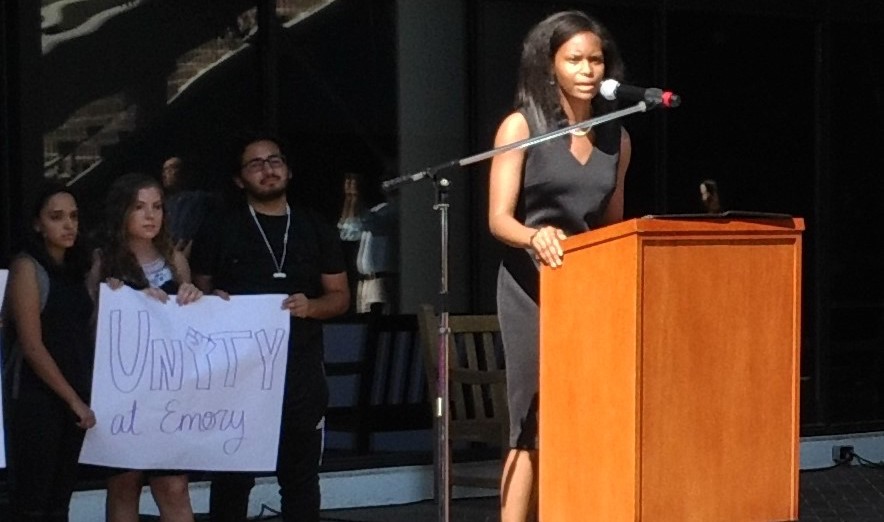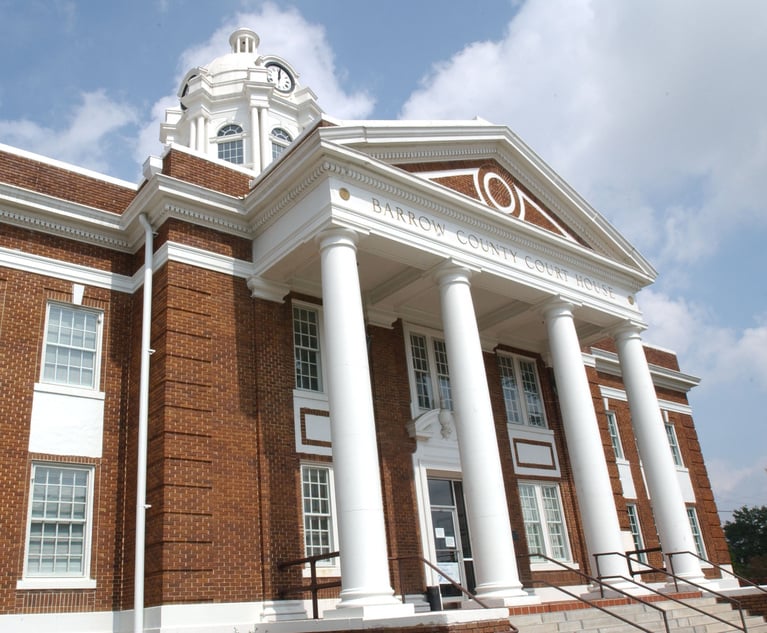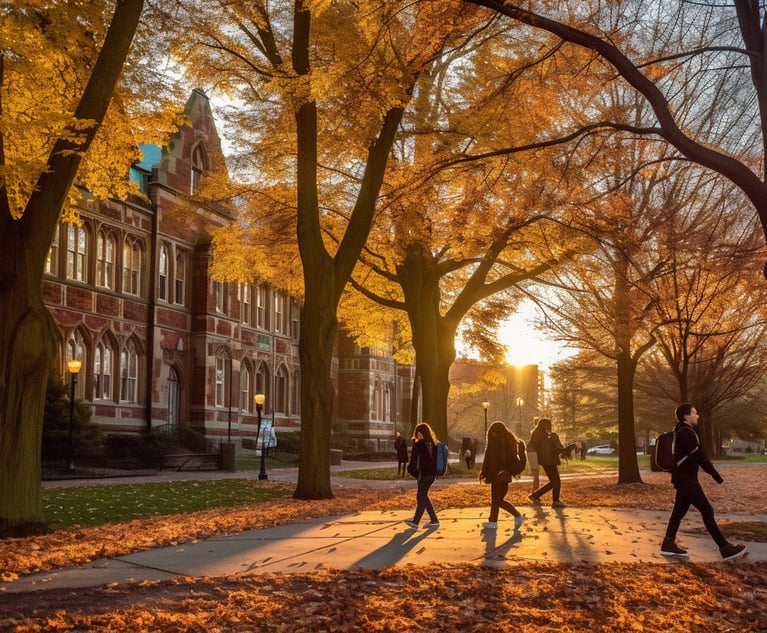After Professor's Alleged 'N-Bomb,' Emory Law Rally Calls for Tolerance, Respect
A Wednesday rally organized by the Emory Black Law Students Association refrained from criticizing a professor accused of using the toxic term, instead calling for tolerance and a need to "be comfortable being uncomfortable" in discussing charged language and attitudes.
August 29, 2018 at 09:32 PM
5 minute read
 Wrenica Archibald, president of Emory's Black Law Students Association, speaks at a rally Wednesday after a law professor used a racial slur during the first week of class. (Photo: Greg Land/ALM)
Wrenica Archibald, president of Emory's Black Law Students Association, speaks at a rally Wednesday after a law professor used a racial slur during the first week of class. (Photo: Greg Land/ALM)
Roughly 200 Emory University students—most sporting black T-shirts or other black garb in solidarity—gathered on the law school's lawn on a sweltering Wednesday afternoon for a rally after last week's revelations that a law professor allegedly used a racial slur during a torts class.
While some of the attendees were pointed in both their observations—including one holding a sign simply proclaiming “Not at Emory” and a more pointed “I am not a N****R”—the organizers and speakers hewed to its theme of unity, respect and tolerance.
“The main thing we're here about today is not about the professor,” said Wrenica Archibald, a 2016 Emory grad and current law school student who heads the campus branch of the Black Law Students Association.
“This is about our community as a whole—we have to have these uncomfortable conversations,” said Archibald, as students gathered for the rally, including many whose professors delayed classes so students, and a sizable cadre of instructors, could attend.
The incident occurred during the first week of class on Aug. 23 when professor Paul Zwier was discussing a 1967 case involving a black man who was denied service at a Texas restaurant by a manager who “shouted that he, a Negro, could not be served in the club.”
According to student reports, Zwier used the term in class, although in a three-page statement to the faculty apologizing for the incident, Zwier said he didn't actually recall whether he used the term but accepted that he may have.
Zwier's letter said he had previously wondered whether the plaintiff was actually called the “n word,” and so may have “misspoken” in class and used the actual slur, or “mispronounced negro, or said something else.”
Emory relieved Zwier of his classes and launched an investigation.
On Wednesday, Archibald—who has not studied under Zwier—said she was contacted by several students in the class after the incident, adding that Emory Law Dean James Hughes Jr. convened a “quiet and respectful” meeting to discuss their concerns after the incident became known.
Archibald said that students were feeling “hurt and broken” by the use of the slur but emphasized the solution is to “challenge our definitions of fear, respect and dignity.”
“We cannot be overcome with grief or shock. … We must be comfortable with being uncomfortable” and address the issue head-on, Archibald said.
Emory Law's Student Bar Association President Nicole ElMurr and Emory President Claire Sterk also spoke. As testimony to the school's dedication to equality and tolerance, Sterk recalled the legacy of civil rights icon the Rev. Martin Luther King Jr., namesake of a scholarship at Emory, and President Jimmy Carter, who has served as a distinguished professor at Emory since 1982.
Archibald wrapped up the rally with a renewed call for love and tolerance, although not all in attendance were convinced it will be heeded.
Justin Tolston, who just started attending Emory for an advanced law degree—and who was holding the “I am not a N***R” sign—said that, while he hoped Emory's dialogue will be successful, “it's just a bare minimum to save face.”
Zwier, 64, is not a member of the State Bar of Georgia but is a former member of the Pennsylvania Bar and is currently admitted to practice in California and Virginia, according to his online resume.
He received his law degree from Pepperdine University School of Law in 1978 and holds a 1981 Master of Law degree from Temple University School of Law.
Zwier began teaching at Emory in 2003 and previously was professor of law at the University of Tennessee at Knoxville School of Law and at the University of Richmond School of Law.
He also held teaching positions at the William & Mary Law School in Williamsburg, Virginia, and at Temple.
Zwier is not the first Georgia law professor to stumble into the thicket surrounding the use of a racial slur.
In 2014, Mercer University School of Law professor David Oedel was forced to apologize and underwent an investigation after using the same racial slur during a constitutional law class.
At the time, Oedel explained that he was quoting an African-American guest at a symposium who was discussing the late Supreme Court Justice Thurgood Marshall's role in litigating Brown v. Board of Education.
Oedel told the Macon Telegraph that he was “trying to shed an historical light on that era and the vernacular views of some African-American activists about Thurgood Marshall's role in the civil rights movement.”
Oedel did not respond to a request for comment concerning Zwier's use of the term.
Emory University itself faced a similar blow-up in 2003, when anthropology professor Carol Worthman faced an investigation over using the term during a faculty meeting.
Worthman also issued an apology, saying through a school spokeswoman that she was trying to “explain, in my opinion, how my field [biological anthropology] is viewed by cultural anthropologists outside of Emory. I am distressed that I offended unintentionally.”
This content has been archived. It is available through our partners, LexisNexis® and Bloomberg Law.
To view this content, please continue to their sites.
Not a Lexis Subscriber?
Subscribe Now
Not a Bloomberg Law Subscriber?
Subscribe Now
NOT FOR REPRINT
© 2025 ALM Global, LLC, All Rights Reserved. Request academic re-use from www.copyright.com. All other uses, submit a request to [email protected]. For more information visit Asset & Logo Licensing.
You Might Like
View All
From 'Confusing Labyrinth' to Speeding 'Roller Coaster': Uncertainty Reigns in Title IX as Litigators Await Second Trump Admin
6 minute read
University of Georgia School of Law Finds Next Dean on Its Own Faculty
3 minute read
Teen Charged in Barrow School Shooting and His Father to Stay in Custody After Hearings
5 minute readTrending Stories
Who Got The Work
J. Brugh Lower of Gibbons has entered an appearance for industrial equipment supplier Devco Corporation in a pending trademark infringement lawsuit. The suit, accusing the defendant of selling knock-off Graco products, was filed Dec. 18 in New Jersey District Court by Rivkin Radler on behalf of Graco Inc. and Graco Minnesota. The case, assigned to U.S. District Judge Zahid N. Quraishi, is 3:24-cv-11294, Graco Inc. et al v. Devco Corporation.
Who Got The Work
Rebecca Maller-Stein and Kent A. Yalowitz of Arnold & Porter Kaye Scholer have entered their appearances for Hanaco Venture Capital and its executives, Lior Prosor and David Frankel, in a pending securities lawsuit. The action, filed on Dec. 24 in New York Southern District Court by Zell, Aron & Co. on behalf of Goldeneye Advisors, accuses the defendants of negligently and fraudulently managing the plaintiff's $1 million investment. The case, assigned to U.S. District Judge Vernon S. Broderick, is 1:24-cv-09918, Goldeneye Advisors, LLC v. Hanaco Venture Capital, Ltd. et al.
Who Got The Work
Attorneys from A&O Shearman has stepped in as defense counsel for Toronto-Dominion Bank and other defendants in a pending securities class action. The suit, filed Dec. 11 in New York Southern District Court by Bleichmar Fonti & Auld, accuses the defendants of concealing the bank's 'pervasive' deficiencies in regards to its compliance with the Bank Secrecy Act and the quality of its anti-money laundering controls. The case, assigned to U.S. District Judge Arun Subramanian, is 1:24-cv-09445, Gonzalez v. The Toronto-Dominion Bank et al.
Who Got The Work
Crown Castle International, a Pennsylvania company providing shared communications infrastructure, has turned to Luke D. Wolf of Gordon Rees Scully Mansukhani to fend off a pending breach-of-contract lawsuit. The court action, filed Nov. 25 in Michigan Eastern District Court by Hooper Hathaway PC on behalf of The Town Residences LLC, accuses Crown Castle of failing to transfer approximately $30,000 in utility payments from T-Mobile in breach of a roof-top lease and assignment agreement. The case, assigned to U.S. District Judge Susan K. Declercq, is 2:24-cv-13131, The Town Residences LLC v. T-Mobile US, Inc. et al.
Who Got The Work
Wilfred P. Coronato and Daniel M. Schwartz of McCarter & English have stepped in as defense counsel to Electrolux Home Products Inc. in a pending product liability lawsuit. The court action, filed Nov. 26 in New York Eastern District Court by Poulos Lopiccolo PC and Nagel Rice LLP on behalf of David Stern, alleges that the defendant's refrigerators’ drawers and shelving repeatedly break and fall apart within months after purchase. The case, assigned to U.S. District Judge Joan M. Azrack, is 2:24-cv-08204, Stern v. Electrolux Home Products, Inc.
Featured Firms
Law Offices of Gary Martin Hays & Associates, P.C.
(470) 294-1674
Law Offices of Mark E. Salomone
(857) 444-6468
Smith & Hassler
(713) 739-1250







